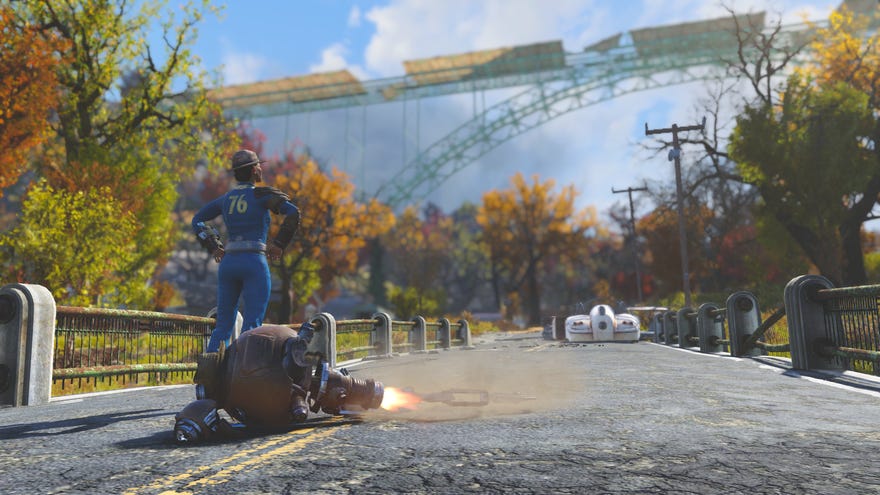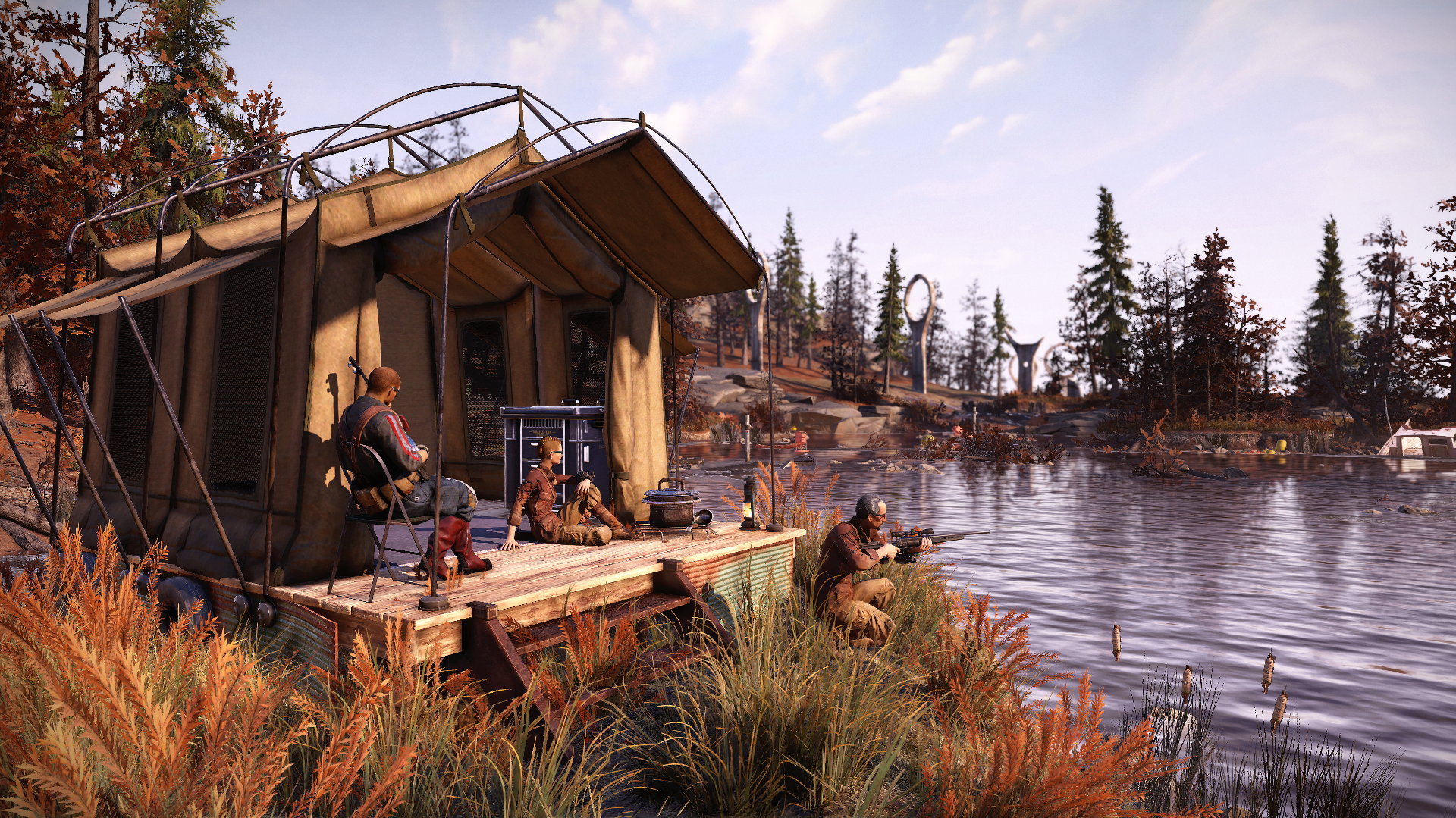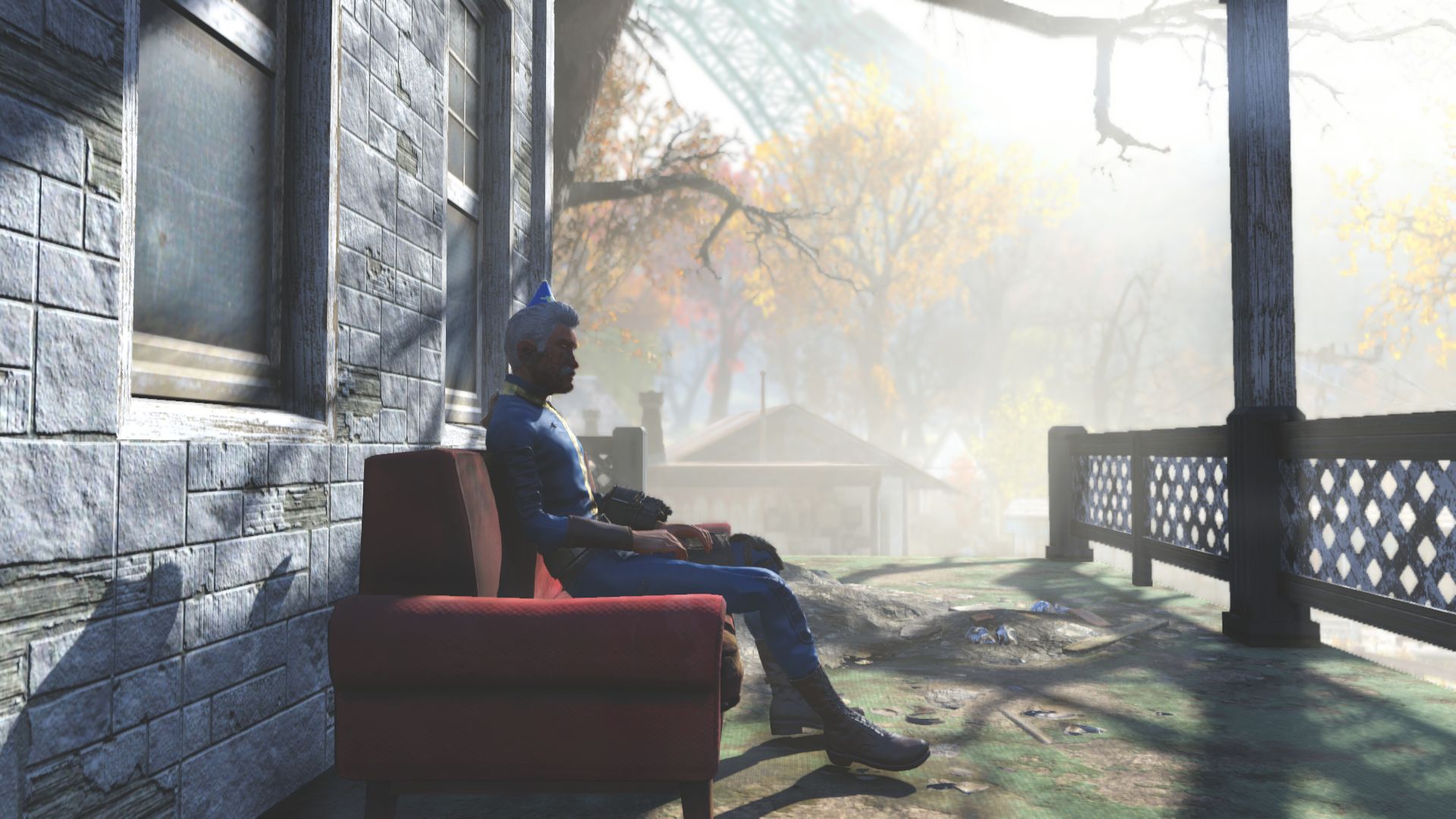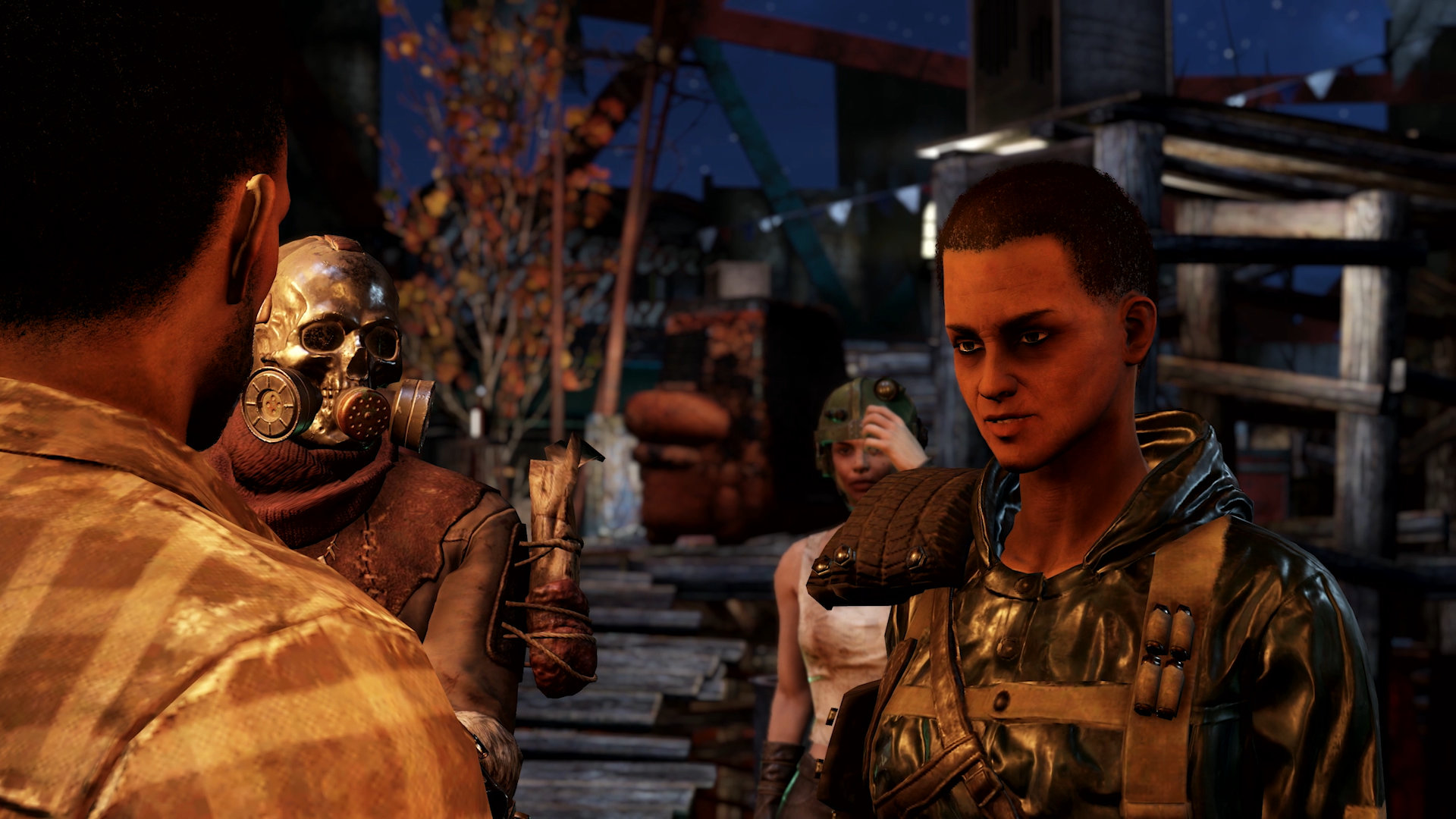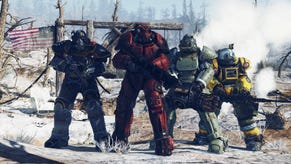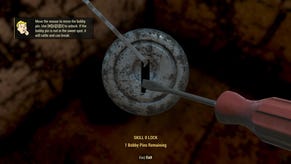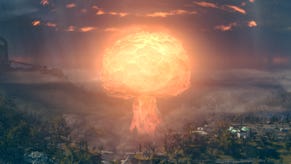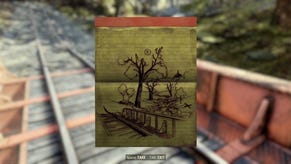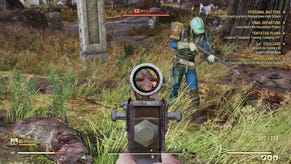Fallout 76 players have a decidedly mixed response to the Fallout 1st subscription
Country roads will now be gravel, unless you have the tarmac upgrade for £1.99/month
At the heart of Fallout 76, there’s always been friction between what people wanted it to be, and what it actually is. To begin with, this manifested as an apprehension over whether an online Fallout game was the right move for the series. Over time, it grew into other concerns about the game’s business model and Bethesda’s perceived mismanagement of the Atomic Shop.
Now, Bethesda have released Fallout 1st, a subscription service for players that costs £12/$13/€15 a month, or £100/$100/€120 a year. It offers benefits such as private servers, an unlimited in-game storage box, and a monthly allowance of Atoms (76's microtransaction currency), and the community is once again in debate. In as much as Reddit should be a barometer for anything, a quick glace at r/Fo76 reveals players making heated arguments both for and against the service. There are suggestions popping up that players who subscribe to Fallout 1st are subject to harassment for it. But feelings on the issue are more complex than the shouting on the internet might suggest
1st is just the latest flashpoint for a game that's had several over its lifetime. Me, I’ve found myself growing to love Fallout 76 since its (somewhat disastrous) launch late last year. Not necessarily as a true successor to earlier Fallout games, given its dramatic tonal shift, but as a fun, post-apocalyptic sandbox that allows for some creative camp building and hilarious player interactions. Like many others, though, I’ve found the Atomic Shop, 76's microtransaction store, to be a constant obstacle to that enjoyment. Atoms become increasingly difficult to grind the longer you play, and the most attractive C.A.M.P. items are always behind a seemingly insurmountable paywall. I’m not alone in feeling like this.
“It's definitely stacked against the non-spender,” says Branden Lizardi, who has been playing the game ever since its Beta. “It's taken me a good while to afford a 700 Atom item. I've given up hope on certain Atomic shop items for this reason. I also find that the prices are a bit too steep to justify spending real money.”
The Atomic Shop became more controversial with the arrival of “utility items”, which many players argue are “pay to win”. Bethesda’s Pete Hines, senior vice president of global marketing and communications, told Gamespot prior to the game’s launch that the Atomic Shop would be purely cosmetic. But there have since been a number of items that contradict this. Examples include refrigerators that keep food and drink fresher for longer, repair kits, and the collectron robot that can collect junk for you so long as you’re willing to pay. They're not bigger guns or better armour, but these items have more than just cosmetic value.
Last week, on October 17, Bethesda posted about update 14, giving some more details on 1st as well as announcing the delay to the Wastelanders update. But the post also says that the changes to the Atomic Store were, at least in part, a direct response to community feedback. But the community is a broad church.
“It feels overly monetised in that they are taking are player suggestions and turning them into utility items,” Fallout player "Hambergurler" tells me, acknowledging that they asked for items like repair kits to be in the game, but not for them to be sold in the shop. “It used to be that we would get a base skinless version in game, and then they would sell us skins of that utility item, which was fine. Then it moved to repair kits, no skins, and sold. I feel it has gone too far.”
As part of Fallout 1st, Bethesda are also offering players the chance to pay for unlimited storage in the game in the form of a scrap box. This has been one of the most requested community features since the game launched, and some are critical that the infinite stash is behind a costly subscription service.
“Some of the perks we're subscribing for are pay for convenience,” Twitter user "SleepisforT" says. They believe that something addressing a game-wide complaint shouldn't be behind the subscription service. “Personally, I feel incredibly guilty about the stash upgrade. I will gladly pay for it but as a large part of the game and something that impacts everyone, I do wish my subscription fee went towards improving that across the board for people."
“I don’t think it’s fair to have any kind of mechanic in game where a player has the opportunity to buy any kind of advantage,” says another player named "SigmaCommand", who sees the scrap box as an example of this in action. “I am already seeing people in chats talking about being able to craft more munitions for their adventures.”
There are those who do see advantages to opting in on Fallout 1st, especially if they already have a monthly spend on Atoms that makes a 1st subscription better value for them. Rach Featherston plays 76 daily and buys a thousand Atoms for $10 a month. “Sometimes I get the bonus, and an outfit for 1500 Atoms," she explains. "I am looking at the servers as an extra $2.99, which totals $12.99. So, I get even more Atoms for my buck [with Fallout 1st], a peace of mind because I mainly play solo, and some awesome extra bonuses.”
While on the surface this does make sense if you’re already spending regularly, it’s worth pointing out that Bethesda are solving a scarcity problem that they themselves created. Items in the Atomic Shop are priced too high, Atomic Shop content is prioritised over in-game plans, and grinding for Atoms is unnecessarily time-consuming. It's not as if Bethesda will want to actively discourage players from spending.
Meanwhile Jim Turner, the co-founder of the Fallout 76 community group the Wasteland Estates HOA, sees the benefits of the service from a different point of view. He pointed me to comments he made on Twitter, where he spoke about the advantages of private servers when putting on events, mentioning the lack of trolls and the absence of long wait times when inviting players to the game.
But yet again, not everyone agrees with this. “It’s a little disappointing as one of the founders of ClubFallout, since it will limit who can play with us,” says "ArtietheRed", the co-founder of one of Fallout 76’s largest community Discords. Artie is concerned that the private servers are currently capped to eight players. “We regularly have over 16 people playing on our Flagship event FalloutFriday. For heavy event days we will have to still use public servers to include as many as possible.”
Nathan Buckley, a programmer at the Manchester studio Prospect Games, says that in their current form the private servers feel like "a cash grab", citing that they have "no persistence, and the server auto closes if I leave, with friends kicked. No controls over the server "config" as well." He adds that the server hire aspect was what he cared about from the subscription, and it feels overpriced.
Further complicating everyone's thoughts on the service are the reports of players experiencing additional issues. These, at least a few of which have now been confirmed by Bethesda, include not being able to prevent members of your friends list joining you private sessions, NPCs and areas appearing pre-looted, and scrap disappearing when added to the scrap box, as well as new crashes and bugs that are sort of expected when a game has a big update.
Speaking to Polygon, a Bethesda representative confirmed that they were looking to give players greater control to restrict access to private servers in an upcoming patch. They've also recently pushed out a hotfix that aims to solve the problem of scrap being swallowed and apparently digested, never to be seen again, by the scrap box, and are looking into ways of reimbursing players that lost items as a result.
But the thing is, when you combine all of the above, plus all the issues at launch, it's hard to view Fallout 1st as anything but a new disappointment splurting out of the same vein. At the moment, there seems to be only a small number of dedicated players who believe they benefit from the service, and even then it's with a list of caveats, or specific circumstances that won't apply to every player. Even if the service manages to fix the launch bugs and ultimately justify its cost, there are other players who are growing increasingly fed up with Bethesda’s constant mishandling of monetisation.
